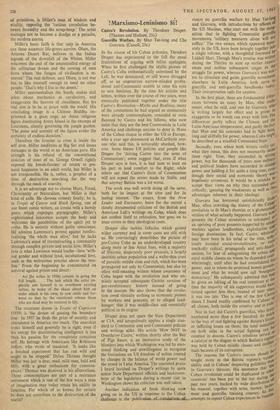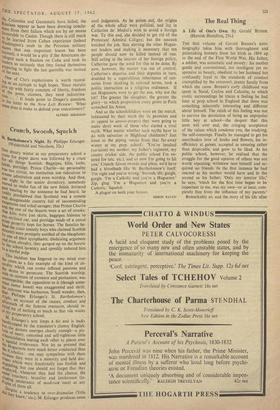!Marxismo-Leninismo SI!
Castro's Revolution, By Theodore Draper. (Thames and Hudson, 21s.)
IN the course of his Cuban polemics, Theodore Draper has experienced to the full the usual frustrations of arguing with leftist apologists. When he first challenged the idyllic picture of Castro's Cuba enthusiastically canvassed by the Left, he was denounced, or still worse shrugged off, as an ungenerous narrow-minded profes- sional anti-Communist unable to raise his eyes to new horizons. By the time his articles and letters, written over the course of two years, were eventually published together under the title Castro's Revolution—Myths and Realities, many of the contentions he had argued so strenuously were already commonplaces, conceded or even flaunted by Castro and his fellows, who now insist that they are the best Communists in Latin America and challenge anyone to deny it. None of the Cuban claque in either the US or Europe, who a year ago denounced as McCarthyite any- one who said this, is noticeably abashed, how- ever. Some blame US policies and people like Draper for 'driving Castro into the arms of Communism'; some suggest that, even if what Draper says is true, it is bad taste at least on his part to lend comfort to the Right; while others say that Castro's form of Communism will not repeat the errors made by Stalin, and that anyway Batista was a lot worse.
The work was well worth doing all the same, both for its impact at the time and for its lasting interest. The essays, from the New Leader and Encounter, leave for the record a closely documented criticism of the British and American Left's writings on Cuba, which does not confine itself to refutation, but goes on to trace errors to their ideological roots.
Draper also tackles fallacies which gained wider currency and in some cases are still with us. He convincingly demolishes the picture of pre-Castro Cuba as an underdeveloped country along more or less Asian lines, with a majority of illiterate, desperately poor peasants, a largely destitute urban population and a wafer-thin crust of parasitic middle class and rich, which has been propagated not only by Communists, but also by often well-meaning writers whose awareness of Cuba began with the revolution and who un- wisely accepted subsequent Castrist versions of pre-revolutionary history instead of going to the sources. He also shows that the revolu- tion owed virtually nothing to economic protest by workers and peasants, or to alleged land- hunger; tbat it was middle-class arid essentially political in its origins.
Draper does not spare the State Department or CIA, and scrupulously applies a single stan- dard to Communist and anti-Communist policies and writings alike. His article 'How NOT to Overthrow Castro,' written shortly after the Bay of Pigs fiasco, is an instructive study of the blunders into which Washington was led by emo- tional thinking and unwillingness to recognise the limitations on US freedom of action created by changes in the balance of world power and the mood in Latin America. The unstinted praise I heard lavished on Draper's writings by quite senior State Department officials and backroom- boys of the legislature during a recent visit to Washington shows his criticism was well taken.
Another indication of fresh thinking now going on in the US in response to the Cuban challenge is the publication oLaranslations,
THE SPECTATOR, AUGUST 17, 1962 I essays on guerrilla warfare by Mao Tse-1114 and Guevara, with introductions by officers of the US Marines, who start out with the recog- nition that in fighting Communist guerrilla movements 'military measures alone will not suffice.' The two essays, which appeared sepal' ately in the US, have been brought together int° a single volume, with a thoughtful foreword bY Liddell Hart. Though Mao's treatise was written during the Thirties to sum up earlier exPeri" ences and outline subsequent stages in t-11,e struggle for power, whereas Guevara's was %lir ten to stimulate and guide guerrilla movements elsewhere in Latin America, both serve ag guerrilla and anti-guerrilla handbooks ioda51' Their interpretation calls for caution.
In the first place, there are fundamental differ- ences between an essay by Mao, who reallY meant what he said, and one by Guevara, who is writing largely for effect and is prone tn exaggerate or let words run away with him. The differences partly reflect the Chinese and the, Latin-American temperament, and partly the fac,` that Mao and his comrades had to fight halm long and skilfully for power, whereas Cuba met be described as a windfall Communist State.
Secondly, even where both writers really saY what they mean, this does not necessarily Make them right. True, they succeeded in seizing power, but for thousands of years now militarY and political leaders have succeeded in seizing' power and holding it for quite a long time, eve° though their social and economic theory 05s hopelessly erroneous. It would be a mistake t° accept their views on why they succeeded urr critically, ignoring the weaknesses as well as the advantages inherent in their ideology.
Guevara has borrowed uninhibitedly fc0_,`"--01 Mao, often rewriting the history of the Cub4,',. ' revolution to fit Mao's theories or a glamouriseo,:ii version of what actually happened. Guevara rlos_ra presents the Cuban revolution in retrospect np an uprising of poor peasants supported by urbnii workers against landlordism, exploitation atr,t1 foreign domination. In fact, Castro, whatev0,„!! may have been in his mind at the time, Ou. lously avoided social-revolutionary, or eve,t markedly radical, propaganda and anti-Alnert; canism, for fear of antagonising the urban ott'. rural middle classes on whom he depended over." whelmingly, until after he had consolidated 1115 power, and to whom he promised honest goverO: ment and what he would now call'bourge°1.; democracy.' He subsequently admitted that 1134 he given an inkling of his real intentions at tue time the majority of his supporters would Ilovri turned against him then, instead of later Wile_ it was too late. This is one of the few Casa", theses I found readily confirmed by Cubans.01 all classes, both inside the country and in ext1°.
Nor in fact did Castro's guerrillas, who nel
numbered more than a few hundred, do in the way of real fighting against Batista's fore.ee! or inflicting losses on them; the total casuallib: on both sides in the actual fighting can, ,5 counted in dozens. Castro's rebellion serve°. '0 a catalyst to the disgust in which Batista's regiol, was held by Cuban middle classes and intellec tuals because of its corruption. The reasons for Castro's success should r, sought more in the Batista regime's vultl,„e„0 ability and in Cubans' despairing gullibility in Guevara's theories. His assurance that hnier Cuban revolution could be duplicated in ° nt,he countries' has been put to the test during if past two years, backed by wide distribution; his manual, together with arms, money. inct far, ment and guerrilla training courses. 30 or attempts to repeat Cuban experiences in Vene Oa, Colombia and Guatemala have failed; the Russians appear to have been drawing conclu- sierls from their failure which are by no means favourable to Castro. Though there is still much to be learned from Cuban experience (indeed w,ashington's snub to the Peruvian military siuews that one important lesson has been Learned), it would be a pity if the Americans de- 'eloped such a fixation on Cuba and took its leaders so seriously that they found themselves Preparing to fight the last guerrilla war instead
of the next.
i„ °Re of Che's euphemisms is worth record- ."g as an epitaph to high hopes. 'Since recruits Jo°in uP with fuzzy concepts of liberty, freedom tt the press, etcetera, they need indoctrina- in"' • • It lends point to Draper's question, his letter to the New Left Review: 'What Sense does it make to defend your executioners?'
ALFRED SHERMAN































 Previous page
Previous page